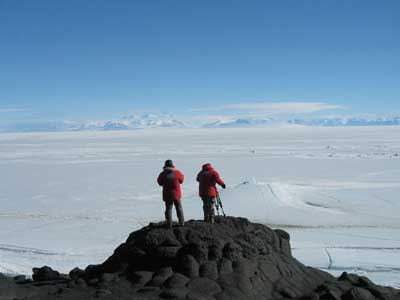
I was on the programming committee for Silverdocs this year, which has made the question of blogging a bit confusing for me—how do you review an event that you had a hand in creating? My answer for now is to review just those films I hadn’t yet seen in the programming process, those I did not vote on.
One of which was Werner Herzog’s Encounters at the End of the World, in which the director continues on the path of the aging artist who no longer has patience for subtlety and now spells out his ideas for you in plain English. Or with a brick over the head. Back in 1971 Herzog made Land of Silence & Darkness, which is about people who are both deaf and blind, and I still think about the scene where the camera just sits, and sits, and watches a deaf-blind woman as she sits on her bed. The silence, to use a cliche AND pun, is deafening, as we watch her and ponder, where *is* she?
In some later films, as his patience wears thin, Herzog’s camera will linger on a person’s face, but in voiceover he’ll *tell* you what he thinks that person is thinking. And in Encounters at the End of the World, in which Herzog travels to Antarctica to photograph the breathtaking ‘ecstatic imagery’ of the landscape and interview its odd inhabitants, all tact is lost and he moves to damping down the sound while a subject is talking and coming on in voiceover to paraphrase and interpret what the subject is saying as he says it. At least he’s not hiding anymore the fact that he often invents scenarios in his “documentaries”; it’s almost as if he’s making a joke out of it. He does it twice in the film and the audience got a hearty laugh out of it. Much of the film is funny, in fact, which is another, more refreshing trait that has emerged in Herzog’s films as he ages. Most of his early films were deadly dramatic and bombastic, but he seems to have embraced the knowledge that enlightenment means lightening up (to quote that mad genius in his own mind, Mike Myers). In interviews he has always been hilarious while at the same time poetic and thought-provoking, and his films now embody that as well.
And nothing is funnier than the exchange in the film between Herzog and a scientist who studies and lives with penguins. “Can a penguin go crazy?” he asks the laconic man. And he clarifies, “I don’t mean that a penguin will suddenly think he’s Napoelon, but do penguins ever just get fed up with their colonies and leave?” And what follows is the most poignant sequence in the film, a film he vowed in voiceover would not be “another penguin film.” We watch a line of penguins waddling toward the sea in the distance, while one stops and seems confused for a moment, and then begins wandering off alone on a path toward the mountains, and as Herzog points out, toward certain death.
The parallel to humans is obvious, as Herzog has throughout the film (and indeed, throughout his career) been interrogating the various weirdos and “castoffs” who inhabit such an inhospitable place. And I think in his youth Herzog would have let that point make itself.
 Filed by cynthia rockwell at 10:39 pm under Just Movies,Silverdocs
Filed by cynthia rockwell at 10:39 pm under Just Movies,Silverdocs


 1 Comment
1 Comment

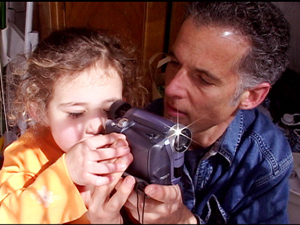 …and I’ll be
…and I’ll be  …I watched the film I was most interested to see,
…I watched the film I was most interested to see,  Perhaps it says something about my tastes or my interests that all of the films I’ve seen so far at Silverdocs offer extreme views of womanhood. Last night’s highlight was The Great Happiness Space: Tale of an Osaka Love Thief, a fascinating film about male “Host Clubs” in Japan. There are apparently hundreds of these clubs all over Japan, and the concept is brilliant: men are the product here, women the consumers, and what the men are selling, they say, are “dreams”. Romantic dreams, to be specific. What the women are paying for isn’t sex, but attention. Flirting, touching, snuggling, romantic gestures. The host’s job is to get the girls to fall in love and therefore become repeat customers. They have it down to a science. Women are very “demanding” they say. They need a lot of superficial compliments. But the most fascinating observation they make is that once they reel the women in with compliments, they switch to scolding. And that’s when the women fall in love. We see a host asking a girl why she does such meaningless things, why she lives her life so frivolously, and the girl is completely rapt. And afterward gushes to the camera about how much she loves him. It is a truth that I as a woman was very uncomfortable witnessing. The entire film was uncomfortable to watch, probably moreso for women than for the men in the audience, who seemed to find much of it to be hilarious. I didn’t see many women laughing.
Perhaps it says something about my tastes or my interests that all of the films I’ve seen so far at Silverdocs offer extreme views of womanhood. Last night’s highlight was The Great Happiness Space: Tale of an Osaka Love Thief, a fascinating film about male “Host Clubs” in Japan. There are apparently hundreds of these clubs all over Japan, and the concept is brilliant: men are the product here, women the consumers, and what the men are selling, they say, are “dreams”. Romantic dreams, to be specific. What the women are paying for isn’t sex, but attention. Flirting, touching, snuggling, romantic gestures. The host’s job is to get the girls to fall in love and therefore become repeat customers. They have it down to a science. Women are very “demanding” they say. They need a lot of superficial compliments. But the most fascinating observation they make is that once they reel the women in with compliments, they switch to scolding. And that’s when the women fall in love. We see a host asking a girl why she does such meaningless things, why she lives her life so frivolously, and the girl is completely rapt. And afterward gushes to the camera about how much she loves him. It is a truth that I as a woman was very uncomfortable witnessing. The entire film was uncomfortable to watch, probably moreso for women than for the men in the audience, who seemed to find much of it to be hilarious. I didn’t see many women laughing. Much easier for women to watch is the story of Leila Khaled: Hijacker. Her world couldn’t have been more different than that of the love-starved women in Osaka. Khaled, who hijacked 3 planes in the 1960s and 70s, had no need for something like a host club, she was too busy being a freedom fighter (terrorist?) for the Palestinian cause and actually altering her beautiful face to avoid capture. And after she was captured, she was insulted when reporters asked her if she had a boyfriend, asked her if she were in love. These things were irrelevant to her. She is now married with children, and encouraged the female director of the film to make babies, but is still every bit the unrepentant soldier. Or terrorist, depending on your view. That’s one of the questions the film poses: what’s the difference between being a terrorist and a freedom fighter? Is the difference simply whether you win or lose?
Much easier for women to watch is the story of Leila Khaled: Hijacker. Her world couldn’t have been more different than that of the love-starved women in Osaka. Khaled, who hijacked 3 planes in the 1960s and 70s, had no need for something like a host club, she was too busy being a freedom fighter (terrorist?) for the Palestinian cause and actually altering her beautiful face to avoid capture. And after she was captured, she was insulted when reporters asked her if she had a boyfriend, asked her if she were in love. These things were irrelevant to her. She is now married with children, and encouraged the female director of the film to make babies, but is still every bit the unrepentant soldier. Or terrorist, depending on your view. That’s one of the questions the film poses: what’s the difference between being a terrorist and a freedom fighter? Is the difference simply whether you win or lose? 1800s and may have killed more than 50 people (mostly men) in Indiana as part of insurance scams. They found the skeletons of 40 of her victims buried on the grounds of her farm, and eventually just stopped digging–so there may be countless more. She killed several husbands, as well as several of her adopted children, and became a very rich woman after collecting their life insurance policies. And like Khaled, she got away with it all. Like the love theives in Japan’s host clubs, she sold romantic dreams to lonely men, only they paid for it with their lives as well as their money. It was an incredibly creepy film–especially the visit to the site of Belle’s farm, where the family that now lives there keeps finding bones in the ground around the house and the youngest child speaks to several ghosts. The film was a bit heavy-handed with the creepiness, though, which threatened to make it almost cartoonish.
1800s and may have killed more than 50 people (mostly men) in Indiana as part of insurance scams. They found the skeletons of 40 of her victims buried on the grounds of her farm, and eventually just stopped digging–so there may be countless more. She killed several husbands, as well as several of her adopted children, and became a very rich woman after collecting their life insurance policies. And like Khaled, she got away with it all. Like the love theives in Japan’s host clubs, she sold romantic dreams to lonely men, only they paid for it with their lives as well as their money. It was an incredibly creepy film–especially the visit to the site of Belle’s farm, where the family that now lives there keeps finding bones in the ground around the house and the youngest child speaks to several ghosts. The film was a bit heavy-handed with the creepiness, though, which threatened to make it almost cartoonish.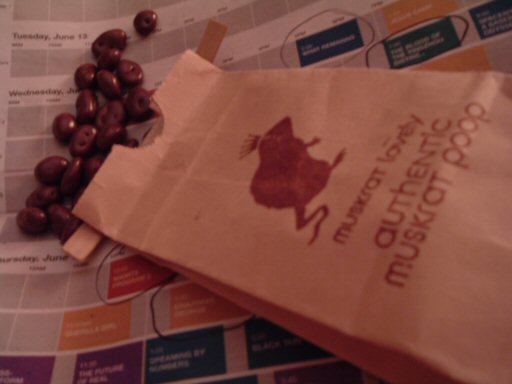
 I met
I met 

 I was most disappointed to have to miss
I was most disappointed to have to miss 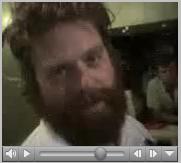
 Have you seen a Jay Rosenblatt film? They are not easy to see, but if you can, see some. Especially
Have you seen a Jay Rosenblatt film? They are not easy to see, but if you can, see some. Especially 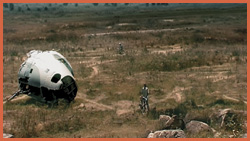 My pick for best of the fest would be the same as the jury’s pick:
My pick for best of the fest would be the same as the jury’s pick:  It seemed I gravitated toward foreign films at the festival, and among those there seemed to be a theme of divisions/walls/barriers. First there was
It seemed I gravitated toward foreign films at the festival, and among those there seemed to be a theme of divisions/walls/barriers. First there was 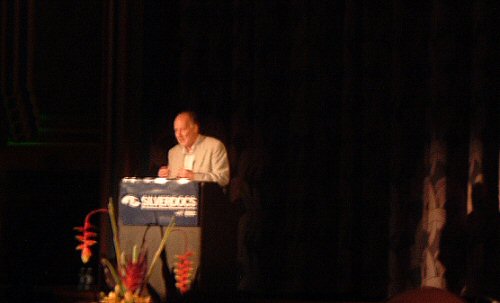
 Patton Oswalt
Patton Oswalt 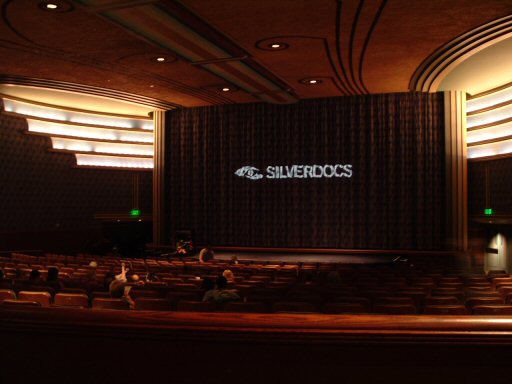
 The next day, on the aforementioned comedy panel (which, in in addition to Brian Posehn and Zach the great, included Paul Provenza, Gilbert Godfried, Judy Gold, and Fred Willard), the discussion turned to the commercial success the comedians have had in sitcoms and other TV shows. Posehn (who was on Just Shoot Me and who is possibly the most well-adjusted comedian I have ever seen) saw no problem with the kind of schizo art/commercial approach to work. “You do stand-up to save your soul, and you take other gigs to pay the bills.”
The next day, on the aforementioned comedy panel (which, in in addition to Brian Posehn and Zach the great, included Paul Provenza, Gilbert Godfried, Judy Gold, and Fred Willard), the discussion turned to the commercial success the comedians have had in sitcoms and other TV shows. Posehn (who was on Just Shoot Me and who is possibly the most well-adjusted comedian I have ever seen) saw no problem with the kind of schizo art/commercial approach to work. “You do stand-up to save your soul, and you take other gigs to pay the bills.”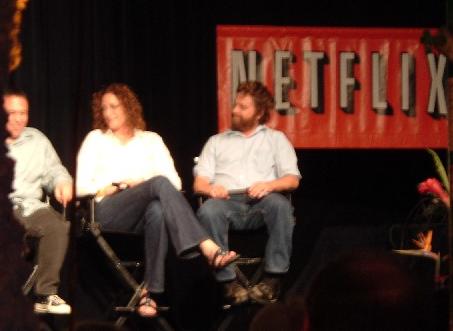 I’m just back from the Netflix party at
I’m just back from the Netflix party at 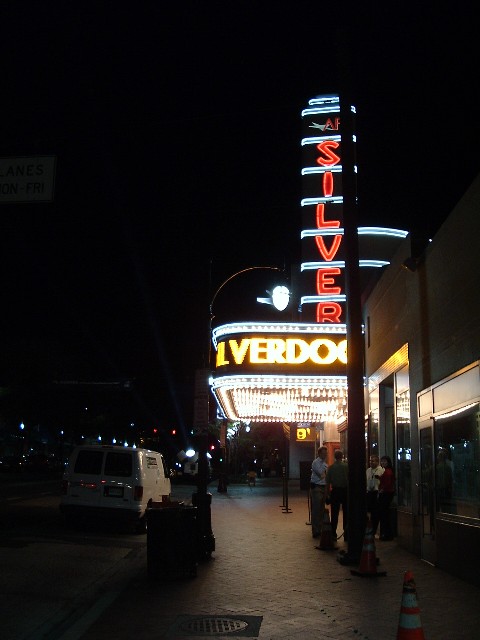

 I have a thing for funny guys. I always have. So I just watched a film that for me is like porn:
I have a thing for funny guys. I always have. So I just watched a film that for me is like porn: